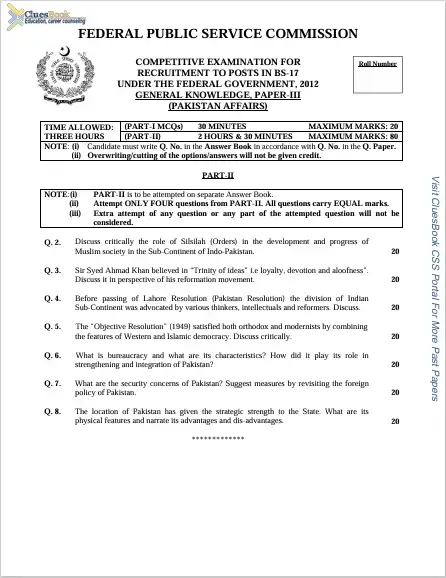CSS Past Papers Of Pakistan Affairs 2012
Download CSS Past Papers Of Pakistan Affairs 2012. The 2012 paper examined real-world themes like energy security and regional diplomacy. Get the original paper in PDF and explore how the examiner tested your grip on governance, strategy, and Pakistan’s evolving global posture.

The 2012 paper marked a transition in CSS testing, from simply knowing history to applying it. Candidates were challenged to analyze contemporary regional issues with maturity. It was not a paper of dates and events, but of causes, consequences, and actionable thinking.
Structure of the Paper
The CSS Past Papers Of Pakistan Affairs 2012 followed standard format but leaned heavily into applied knowledge:
- Total Marks: 100
- Objective Section: 20 marks (MCQs)
- Subjective Section: 4 long questions out of 7 (20 marks each)
- Time Allowed: 3 hours
This paper tested current affairs awareness more than historical detail.
About the CSS
The CSS (Central Superior Services) Competitive Examination is a rigorous federal level test administered by the Federal Public Service Commission (FPSC) to select candidates for prestigious civil service roles across Pakistan. The exam’s rules and regulations, covering age limits, eligibility, subjects, and quotas, are detailed in the official CSS Rules section on the FPSC’s website.
The CSS Exam Rules, issued by FPSC Pakistan, outline eligibility criteria, age limits (21–30 years), and a maximum of three attempts for candidates. The exam includes written tests, a medical exam, a psychological assessment, and an interview. Rules also define quotas, disqualification grounds, and subject selection for a fair recruitment process.
Spotlight on 2012 Themes
Key themes reflected national and international pressures shaping Pakistan’s policy framework:
- Energy crisis and resource management
- Pakistan’s diplomatic position post Osama bin Laden
- Water disputes with India and regional security implications
- Extremism, education, and socio political cohesion
This paper demanded not only knowledge but clarity of thought.
What the Examiner Was Looking For
2012 wasn’t about who memorized facts; it was about who could explain patterns and offer insight:
- Could you interpret how energy insecurity weakens sovereignty?
- Did you understand the regional ripple effects of Pakistan’s foreign relations?
- Could you objectively analyze the causes of extremism without generalizations?
- Did you link internal reforms with external perception?
The best responses showed a balance of analysis, solution driven thought, and maturity.
Recommended Preparation Sources
Don’t overburden yourself with volume; use precise, analytical resources:
-
Essential Reads
- Pakistan’s Foreign Policy by Abdul Sattar
- Energy Crisis in Pakistan by Dr. Sohail Agha
-
Think Tank Material
- Islamabad Policy Research Institute (IPRI) on regional security
- PIDE papers on economic governance
-
Media for Practice
- DAWN’s current affairs editorials
- Al Jazeera’s regional diplomacy reports
Prepare through reading, reflection, and structured opinion building.
Where to Get the Paper
You can download the original CSS Past Papers of Pakistan Affairs 2012 (PDF) from the download link mentioned below in this post. It’s unsolved and tailored for timed practice sessions with an analytical focus. This paper offered no shortcuts. Only those who blended factual grounding with strategic awareness could perform well.
It emphasized Pakistan’s position in a rapidly shifting world order. A good candidate showed clarity, not clutter, relevance, not repetition.

